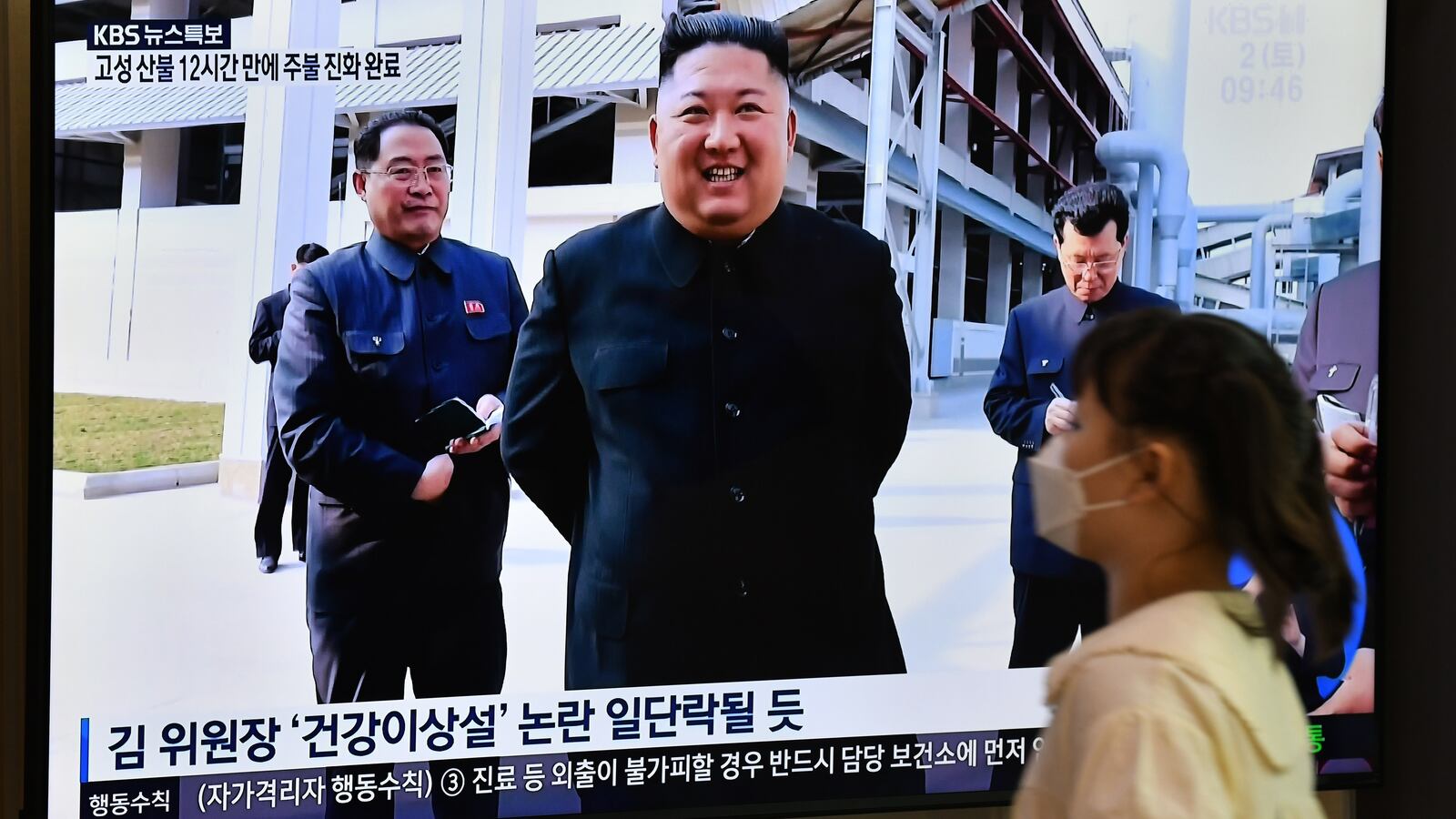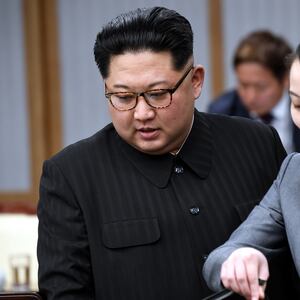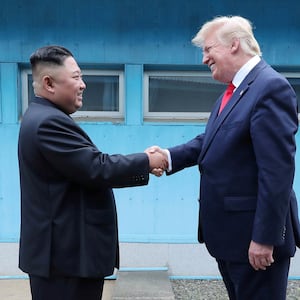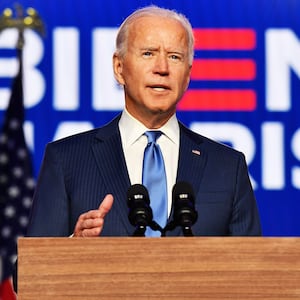North Korea’s leader Kim Jong Un has just fired a volley of threats against the U.S., greeting incoming President Joe Biden with what is likely to be his biggest foreign policy dilemma beginning right after his inauguration on January 20.
It wasn’t simply that Kim engaged in familiar rhetorical flourishes, calling the U.S. the North’s “foremost principal enemy.” He also made clear that his three meetings with outgoing President Donald Trump had totally failed to end his nuclear program—the club that he holds over the U.S., South Korea and Japan.
Kim avoided any mention of Biden, who called him a “thug” and “dictator” in his 2020 campaign debate with Trump. Nor did he mention Trump, who said famously that he and Kim “fell in love” during their first summit in Singapore in June 2018 when they signed a brief statement proclaiming their desire for a “nuclear-free” Korean peninsula.
All such encounters were overlooked in his report to the ongoing congress of his ruling Workers’ Party in which he vowed to produce “nuclear weapons” that were “smaller, lighter and tactical” on the way to “production of a super-large nuclear warhead.”
Kim, who is party chairman, left unstated the obvious—that the hiatus in testing nuclear warheads and the missiles to carry them to distant targets, including the U.S., is over. North Korea last tested a nuke in September 2017, a deep underground hydrogen blast that blew up the better part of a small mountain and is believed to have killed 200 people. Two months later he ordered the test of a long-range missile—the last such display before the two Koreas and the U.S. began a long process of summitry climaxed by the failure of the Trump-Kim summit in Hanoi in February 2019.
Kim foreswore any notion of firing off a nuke other than in defense but said the North had “started building the nuclear force without interruption.” At stake, he said, embellishing on the rhetoric, were “the welfare of the people, destiny of the revolution, existence and independent development of the state.”
All of this suggested he was challenging Biden, leaving the way open for more negotiations in which one thing was certain: his nuclear program is here to stay, and, if anyone is so dense as to think otherwise, he might just stage another nuclear test and order more missile launches to prove it.
Analysts had no doubt Kim meant what he said despite hopes engendered by a speech the day before at the party congress in which he talked of “expanded external relations”—a hint perhaps of his desire to renew dialogue with South Korea and maybe the U.S. on his own terms.
Forget any wishful thinking about Kim softening his policies, offering realistic conditions for talks or compromising as the Biden team, led by Biden’s pick for secretary of state, Antony Blinken, and Jake Sullivan, designated as national security advisor, review policy options.
Biden, said Victor Cha, who served on the National Security Council during the presidency of George W. Bush, may be “in the same position as when he was vice president, encountering relentless test after test from North Korea, crushing any opportunity for diplomacy.” At the least, Kim’s remarks constituted “clear unambiguous commitment to the full nine yards on nuclear weapons,” said Cha, now a professor at Georgetown.
Look out, Cha warned ominously, for “more testing as they develop these capabilities.”
Former senior diplomats in the U.S. embassy in Seoul agreed. “For all of those who were waiting for Kim Jong Un's response to the results of the U.S. presidential election, we now have it,” said Evans Revere. “To the surprise of no one who has been following North Korea's ongoing development of nuclear weapons and ballistic missile delivery systems over the past four years, Kim has bluntly informed the incoming Biden administration of his determination to continue down this path.”
Kim, he said, “has made it clearer than ever” that North Korea “will remain a nuclear power, and that Pyongyang plans to develop an even more credible and diverse nuclear arsenal.”
David Straub saw Kim’s declaration as “reaffirmation of what the regime has been doing for decades,” beginning with the decision of regime founder Kim Il Sung, Kim’s grandfather, to initiate a nuclear program, which gained full force under Kim’s father, Kim Jong Il, who ordered the North’s first two nuclear tests in 2006 and 2009. Kim Jong Un, taking over after his father’s death in 2011, revved up the program, ordering one test in 2013, two in 2016 and again in 2017.
Straub sees Kim’s oratory as a sign of weakness. “With his threats, Kim is whistling past the graveyard,” said Straub. “Kim doesn't need nuclear weapons to ‘deter’ the United States. The U.S. has never tried to attack in nearly seven decades. Kim wants nuclear weapons to bolster his political position at home and intimidate the South. It won't work.”
Biden, he said, should “maintain and increase sanctions” against North Korea and “not be intimidated by Kim’s threats” knowing that “Kim is not suicidal and will not attack the U.S.”
Bruce Bechtol, a former North Korea intelligence analyst at the Pentagon and author of numerous studies on North Korea’s leadership, agreed that “enforcement of sanctions” is needed. “A long-range missile test or an underground nuclear test may be on the horizon in coming weeks,” he said, “as Biden and his people take over.”
But such provocations are not the only options. “I would also be on the lookout for violent provocations against the South,” said Bechtol, possibly along the demilitarized zone between the two Koreas or the Northern Limit Line in the Yellow Sea, below which South Korea bans North Korean fishing vessels. The Yellow Sea has been the scene of numerous incidents in recent years, including the sinking of a South Korean corvette, the Cheonan, killing 46 South Korean sailors, and the shelling of Yeonpyeong Island, in which four people died, in 2010.
Kim’s rhetorical attack on the U.S. places South Korean President Moon Jae-in in the uncomfortable position of pressing for reopening of dialogue with Kim, whom he met four times in 2018 and 2019, while trying to remain on decent terms with the Americans. Rather than comment directly on Kim’s tough talk, a spokesman for the South’s unification ministry called for carrying out agreements reached between North and South, renewing efforts “for peace and prosperity on the Korean peninsula.”
North Korea has bitterly criticized Moon, a left-of-center leader who has maintained the U.S. alliance while adopting a soft-line approach. Kim’s unhappiness with Moon’s ambivalent stance was most evident when North Korean soldiers in June blew up a liaison office that Moon had established just inside North Korea for officials to meet and sort out issues.
Any improvement in policy, Kim told the party congress, would depend on “U.S. withdrawal of its hostile policy.” His policies, he said, would focus “on containing and subduing the U.S., the fundamental obstacle to the development of our revolution and our foremost principal enemy.”
“Kim seems intent on using continued unchecked military development as leverage to shift the conversation with the U.S. from denuclearization to arms control,” said Scott Snyder, Korea expert at the Council on Foreign Relations. That only “sharpens the dilemma for Biden between the need to maintain crisis communication with North Korea and the apparent limited space for negotiated progress toward denuclearization.”
Kim “defines an end to the U.S. hostile policy as the end of the alliance, removal of troops from South Korea and an end to extended deterrence and the nuclear umbrella,” said David Maxwell, a former special forces colonel, now senior fellow at the Foundation for Defense of Democracies.
Still, Kim “seems to be willing to negotiate,” said Maxwell, “from an arms control perspective with the U.S. and North Korea as ‘equals.’” And of course, Kim wants North Korea “treated as a nuclear power” with “no intention of giving up his nuclear weapons.”
Sure, Kim “claims he will be a responsible nuclear power and will refrain from use if he is not targeted,” said Maxwell. The implication is plain: For Biden & co., it’s back to square one in the next installment of the never-ending drama of what to do about North Korea.









